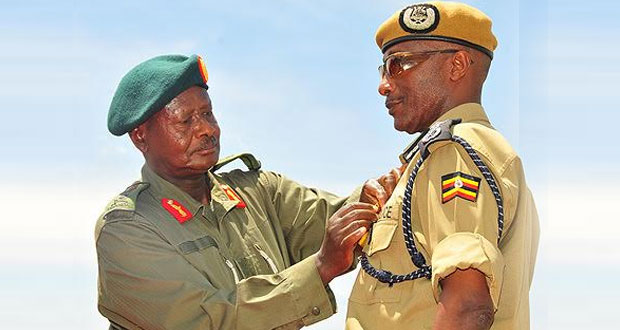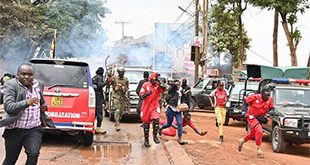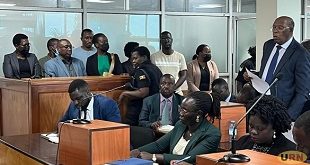
Unlike what the public is hoping for, ending criminality in the police is not the President’s biggest concern
COMMENT | JOSEPH WERE | Following recent revelations of shocking criminality in the Uganda Police Force, Inspector General Kale Kayihura’s number is up it appears. Equally feeling the chill wind must be President Yoweri Museveni who must make at least three serious decisions regarding the force’s politics, loyalty, and budget.
Museveni knows that 90 percent of police officers are not criminals, although the tiny 10 percent pollutes the air so badly that it is difficult to sniff the strawberry from the garlic.
However, although the recent arrest of Kayihura’s ally; one Abdullah Kitata, the obnoxiously noisy leader of the so-called Boda-Boda 2010 gang set off a heavy stench, treating the other security agencies like the Internal Security Organisation (ISO) and the Chieftaincy of Military Intelligence (CMI) which were dreaded names in previous years as angels is a mistake. Their current leaders; including Security Minister Henry Tumukunde, CMI boss Abel Kandiho and ISO boss Bagyenda Kaka cannot be anti-criminality altar boys.
The police entanglement with the underworld has tainted Kayihura’s image and that of the police so badly that they need to be scrubbed using a very strong brush and a detergent that is ten times stronger than JIK. But Museveni knows that Ugandans have short memories and he has long term plans.
While many people are surprised at the level of police criminality, Museveni possibly is not. So while many commentators are focusing on how to end the criminality, Museveni most likely isn’t.
The view that Ugandan police stations are dens of criminals might be news to many but not Museveni. His intelligence network has furnished him with even the scariest bits; that the police are hiring out guns to criminals, aiding drug, ivory, and human traffickers, and using fake charges in extortion rackets and torture and killing suspects.
Museveni must have seen a video that aired recently of policemen battering an NBS TV journalist reporting on criminals who confess to be police collaborators in crime. One collaborator, ex-convict Paddy Sserunjoji alias Sobi, in December shook airwaves when he confessed on TV to killing people. Another criminal had told IGP Kayihura the same thing at a suspects’ parade at Katwe police station in Kampala before he was ordered to shut up. Police collusion with the kiboko squad, Kifeesi and other goons is well documented. Museveni said as much after the murder of then AIGP Felix Kawesi.
So police criminality is not news to Museveni. He could have acted already if it was his main concern. Instead, he must be devising a strategy that ensures the force remains a political tool of his government, that the army of boda-boda and other urban youth remain firmly loyal to NRM, and that the Shs530 billion budget of the police force does mainly NRM work. If Tumukunde, Kandiho, Kaka, or anyone else can guarantee these three items for Museveni, they will oversee the police.
Museveni is not focusing on merely removing Kayihura because that is simplistic and will not solve the problem. That is because Kayihura is a problem only operationally. Even here, the bigger problem is systemic, and a result of our society and politics. For Museveni, Kayihura is politically impeccable.
So Museveni will calculate that generally speaking, removing a police boss like Kayihura per se does not solve operational problems because the patterns of criminality in the Uganda Police force can be seen all over the world; from London to New York, Brazil to Mexico, Egypt to South Africa, and Nigeria. In fact, compared to others, the criminals in the Uganda police are babies.
Consider this: Hungary gave its police the biggest pay rise in history but corruption persisted. It sacked 240 but corruption remains. In Argentina the police have been involved in terrorist bombings, murder of journalists, drug trafficking, cattle rustling and more. Police officers in Brazil are hit men for criminal gangs and aid drug traffickers. In one incident 42 policemen were paid US$1000 for each person they killed on behalf of criminal gangs in the city of Rio Branco. Another 150 policemen were hired by powerful landlords to murder hundreds of squatters on land. The cases were quashed in courts after judges were bribed. In Los Angeles, USA, up to 70 police officers went on trial for routinely beating and shooting suspects, planting fake evidence, and lying under oath. In New York City, USA, two police officers sodomised a man with a stick at a police station. The case was reported and ignored.
So the criminality in the Uganda Police Force is not unique. It will continue under new leaders or worsen because what the police require operationally is not individual change at the top but organisation-wide change right to the bottom.
Kayihura came to the force as a cerebral, clean operator. But he found a police force that recruits many wrong elements from our sick society, trains them poorly, and promotes some on the basis of technical know-who. The force is plagued by low pay and lack of resources, functional accountability and disciplinary mechanisms. It finds and recruits easy accomplices in crime in other state agencies and department; especially the courts.
But the bigger problem is that professionalism is not demanded. Only political loyalty to Museveni and relentless effort to preserve Museveni’s power are required. This foments a culture of indiscipline, impunity, and total lack of professional standards.
Kayihura initially succeeded in turning the police around; especially when he was propagating the concept of community policing. He improved facilities; including transport, regular pay, training, housing, and more. However, the project started stuttering when short-term politically expedient moves and lack of resources led to more reliance on criminal militias to catch other criminals or defeat opposition protests.
Of course no police officer likes what is going on and the public expects change. Unfortunately, things are no so straight-forward for Museveni. Under Kayihura, the police force has got a huge budget. Museveni cannot withdraw it overnight. Yet he cannot let it fall into untrustworthy hands.
As Niccolo Machiavelli wrote in `The Prince’: “It must be remembered that there is nothing more difficult to plan, more doubtful of success, nor more dangerous to manage, than the creation of a new system. The initiator has the enmity of all who would profit by the preservation of the institutions and merely lukewarm defenders in those who would gain by the new one.”
This means Museveni will reflect deeply about the individuals to select to sort out the police. It means criminality in police will remain because Museveni’s decision will be political, not operational.
 The Independent Uganda: You get the Truth we Pay the Price
The Independent Uganda: You get the Truth we Pay the Price



muzei is very right
Excellent post! We will be linking to this great content on our site.
Keep up the great writing.
Police masindi assaulted me ,PSU Hoima carried out investigations and sent the file to psu kampala where i have moved several times .They have been deceiving me that the file is with legal ,i reached there several times,it was missing.Psu kampala said again the file was with Dpp i contacted them its missing case number PSU/HMA/GEF/57/2017
You may have to travel to Entebbe and appeal to Al Capone himself.
Yoweri Museveni is right in his perspective of thinking.